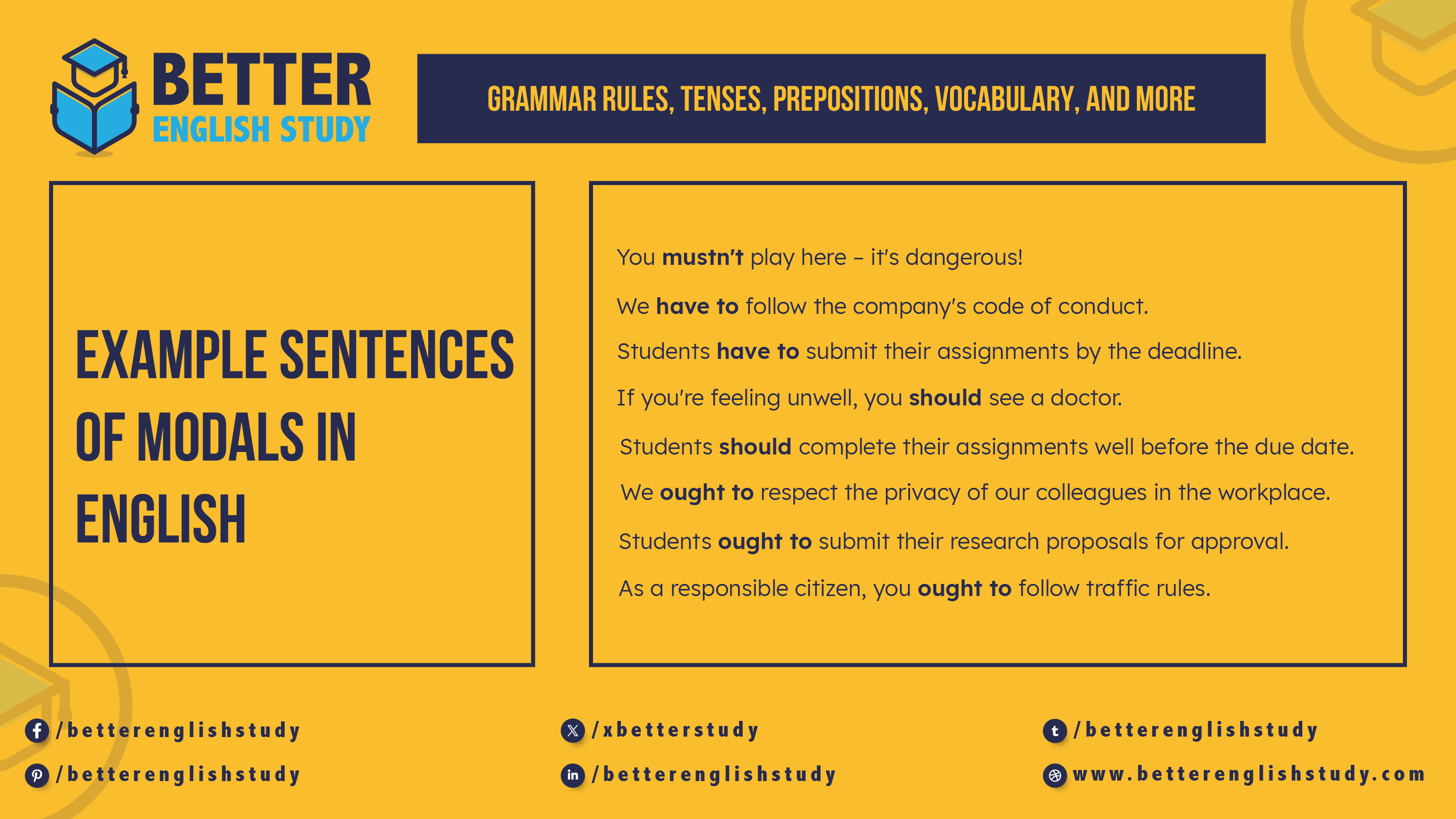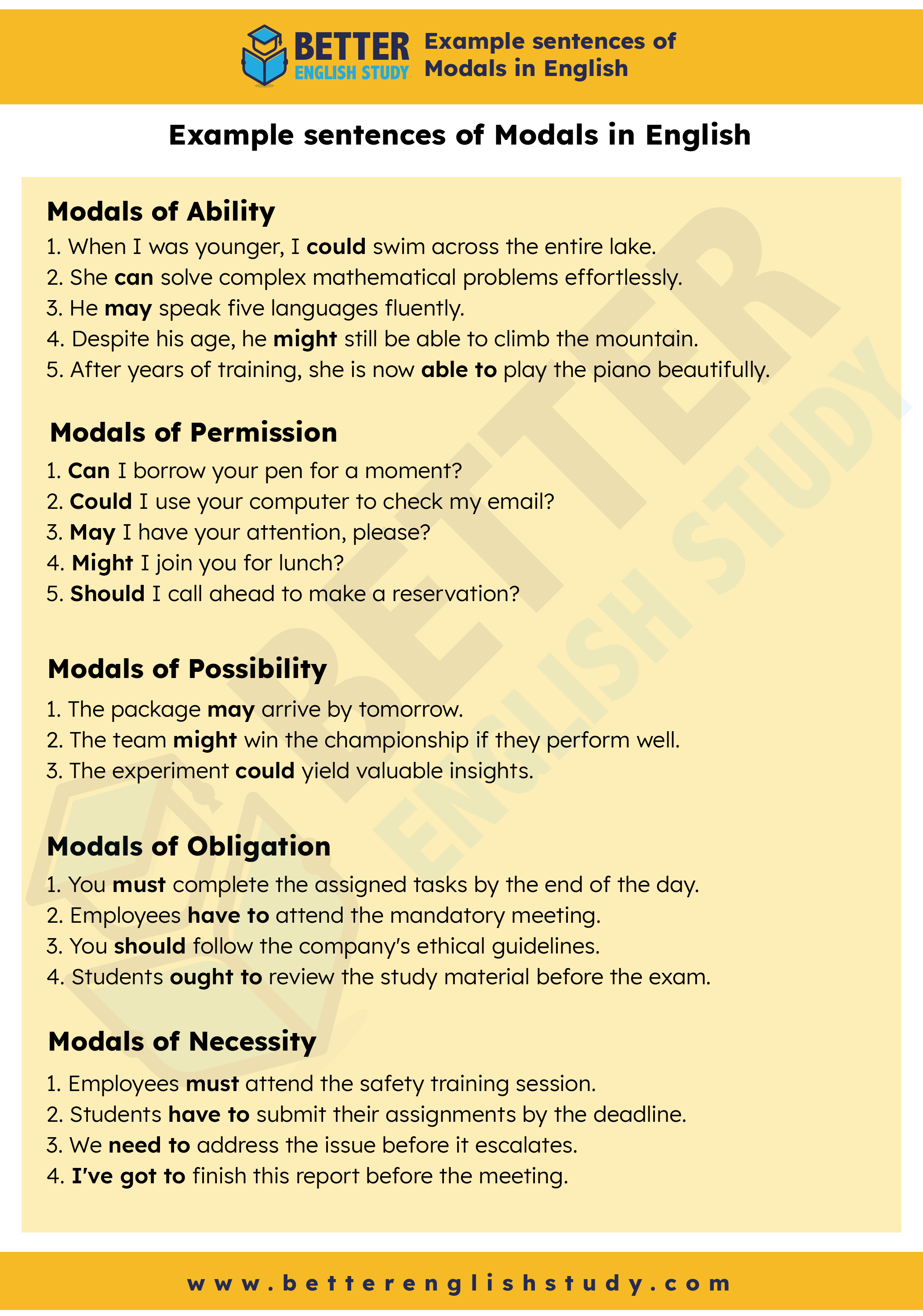
In the intricate landscape of English grammar, modals stand as versatile tools that lend nuance and precision to our expressions. From conveying abilities and permissions to expressing necessity, possibility, and obligation, modals play a pivotal role in effective communication.
In this exploration, we’ll delve into 25 examples of modals, grouped by their functions, accompanied by clear explanations to demystify their usage.
Modals of Ability
1. Can
- Example: She can solve complex mathematical problems effortlessly.
- Explanation: ‘Can’ is used to express the present ability of the person to solve mathematical problems with ease.
2. Could
- Example: When I was younger, I could swim across the entire lake.
- Explanation: ‘Could’ here indicates the past ability of the person to swim a considerable distance.
3. May
- Example: He may speak five languages fluently.
- Explanation: ‘May’ suggests the possibility or ability of the person to speak multiple languages fluently.
4. Might
- Example: Despite his age, he might still be able to climb the mountain.
- Explanation: ‘Might’ conveys the possibility or ability of climbing the mountain, despite potential challenges.
5. Be Able To
- Example: After years of training, she is now able to play the piano beautifully.
- Explanation: ‘Be able to’ is used to express the achieved ability to play the piano beautifully after consistent training.
Modals of Permission
6. Can
- Example: Can I borrow your pen for a moment?
- Explanation: ‘Can’ is employed to seek permission to borrow a pen.
7. Could
- Example: Could I use your computer to check my email?
- Explanation: ‘Could’ is utilized to request permission politely to use someone else’s computer.
8. May
- Example: May I have your attention, please?
- Explanation: ‘May’ is employed to seek formal permission, especially in public settings.
9. Might
- Example: Might I join you for lunch?
- Explanation: ‘Might’ is used to express a polite request for permission to join someone for lunch.
10. Should
- Example: Should I call ahead to make a reservation?
- Explanation: ‘Should’ is employed to seek advice or suggestions regarding the action of making a reservation.
Modals of Necessity
11. Must
- Example: Employees must attend the safety training session.
- Explanation: ‘Must’ conveys a strong obligation for employees to attend the safety training session.
12. Have To
- Example: Students have to submit their assignments by the deadline.
- Explanation: ‘Have to’ indicates a necessary requirement for students to submit assignments on time.
13. Need To
- Example: We need to address the issue before it escalates.
- Explanation: ‘Need to’ emphasizes the necessity of addressing the issue to prevent it from escalating.
14. Have Got To
- Example: I’ve got to finish this report before the meeting.
- Explanation: ‘Have got to’ expresses a strong personal obligation to complete the report before the meeting.

Modals of Possibility
15. May
- Example: The package may arrive by tomorrow.
- Explanation: ‘May’ indicates the possibility or likelihood of the package arriving within the specified timeframe.
16. Might
- Example: The team might win the championship if they perform well.
- Explanation: ‘Might’ suggests the possibility of winning based on good performance.
17. Could
- Example: The experiment could yield valuable insights.
- Explanation: ‘Could’ expresses the potential for the experiment to provide valuable insights.
Modals of Obligation
18. Must
- Example: You must complete the assigned tasks by the end of the day.
- Explanation: ‘Must’ conveys a clear obligation for the person to complete the assigned tasks promptly.
19. Have To
- Example: Employees have to attend the mandatory meeting.
- Explanation: ‘Have to’ indicates a necessary obligation for employees to attend the mandatory meeting.
20. Should
- Example: You should follow the company’s ethical guidelines.
- Explanation: ‘Should’ conveys a suggestion or strong advice to adhere to the company’s ethical guidelines.
21. Ought To
- Example: Students ought to review the study material before the exam.
- Explanation: ‘Ought to’ emphasizes a moral or advisable duty for students to review study material before the exam.
The rich tapestry of modals in English allows for precise and nuanced communication across various scenarios. Whether expressing abilities, seeking permissions, addressing necessities, exploring possibilities, or acknowledging obligations, these modals serve as indispensable linguistic tools.
By understanding their applications and nuances, language learners can navigate the complexities of English grammar with confidence, ensuring effective and accurate communication in diverse contexts. So, embrace the versatility of modals and let them enhance your linguistic prowess in English.
